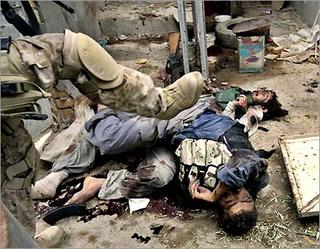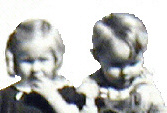

Iraq & Vietnam: Any similarities? So you think I'm trying to to avoid this subject I promised earlier to address, do you? Honestly, I'm not, but in light of the second delay by the Iraqi constitutional committee today, I decided to wait for the outcome of this critical marker before straining my remaining active brain cells any further. In the meanwhile, however (if you care at all), here are some random thoughts defining my ambivalent, interim position on the major event of the new century so far.
Despite the lipstick we've been trying to apply to the pig's snout, this obstinate porker still isn't looking very pretty. President Bush is clearly worried (as he should be) and he's showing it by making extensive use of his bully pulpit to try and shore up support for the Iraq adventure. Is it possible that the sweat, blood, and billions we've spent the past two years will end in a civil war over which we'd have no control? Is it possible that this fictitious country, cobbled-together by the winners who divided the spoils of World War One, will decay into becoming the center of long-term Middle East chaos, instead of the role model from which we had hoped extensive economic, political, and cultural reform might emanate?
When the specter of invading Iraq appeared in the media, I was amazed and simultaneously puzzled. As a "natural conservative" (I don't believe this translates to "neo-con"), I struggled to read between the lines, especially after Secretary of State, Colin Powell, made an uncharacteristic (he's always been careful to promote and preserve his image) fool of himself before the United Nations. His sophomoric presentation of so-called evidence that was supposed to be the compelling reason for the U.S. to take drastic action was simply dumbfounding!
As a former intelligence officer, trained for and having worked at the national level in the late 1970s, it was clear to me that Colin Powell's native intelligence had somehow lapsed, or that he was being shamefully complicit by giving a presentation that he, of all people, should have known was foolish and without convincing substance. While he was sweating out his televised presentation before the U.N., I was more interested in the body language and facial expression of the then-CIA chief, George Tenet, sitting just behind and to Powell's right. By the end of the speech, I was convinced something was dreadfully wrong. (How it is that he was not only not sacked long ago, but awarded the Freedom Medal after finally resigning, remains a mystery to me.)
Despite my uneasiness, I decided to "suck it up" and back the President's decision to invade. After all, I told myself, there must be a grand strategy being played out. I tried to convince myself that it probably had to do with a Bismarckian power political strategy: Establishing a major, historic, and permanent presence in the Middle East. Such a strategy would be truly revolutionary, as geopolitical theory goes, by permanently influencing and reforming the entire region. Not only would western interests be preserved and advanced, but up to 500 million Muslims would be ultimately "liberated" (from themselves), beginning with the liberation of Saddam's brutally oppressed. Yes, yes, yes! Such a grand strategy would be much too complicated to explain to and unlikely to win support of the masses, so best work up the WMD and Al Qaeda links as justification--everyone'll understand that. Yes, yes, yes! Now I understand. And so "sucking it up" became a little more palatable for me. Was I involved in a classic case of rationalizing? Or was I on to something? If that was the grand strategy, it's clear that the wheels of that bicycle are now getting wobbly.
So I prefer to wait a little longer before committing myself to a position. When and if I finally realize one, I will willingly share it. It's clear that history is being made daily. The problem with living through historic change is that, like the proverbial forest, it's hard to see it, for the interference of all the trees. But that's the challenge for all of us, isn't it? Being able to discern the size and shape of the forest will allow us to map a way out of (or around) it.
I still haven't addressed the "Vietnam element" (if there is one), but I will. More on this later.

No comments:
Post a Comment